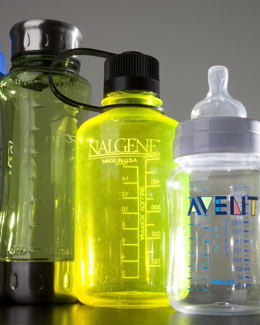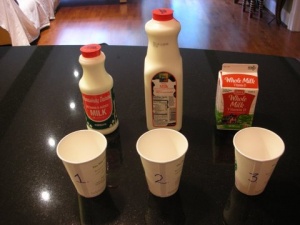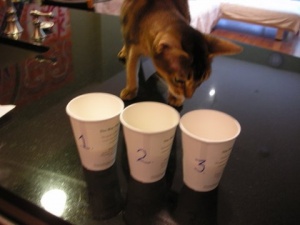December 1st, 2009 by Dr. Val Jones in Audio, Expert Interviews
1 Comment »
 There has been a lot of media attention surrounding the safety of polycarbonate plastic products containing bisphenol A (BPA). BPA is found in polycarbonate, hard clear plastic products like eye glasses, bicycle helmets, and food containers, and also in epoxy resins that act as protective coatings on everything from food and beverage cans to steel pipes and car engines.
There has been a lot of media attention surrounding the safety of polycarbonate plastic products containing bisphenol A (BPA). BPA is found in polycarbonate, hard clear plastic products like eye glasses, bicycle helmets, and food containers, and also in epoxy resins that act as protective coatings on everything from food and beverage cans to steel pipes and car engines.
In the next week or so, the FDA is expected to provide a new analysis of the science behind BPA safety. To gain some insight into what the fuss is all about, Dr. Steve Novella and I interviewed Dr. Steven Hentges (Executive Director of the Polycarbonate/BPA Global Group of the American Chemistry Council) on a blogger briefing call.
You may listen to the entire conversation here (and please read on for my summary of the issues):
[audio:https://getbetterhealth.com/wp-content/uploads/2009/12/bpacall.mp3]
Read more »
November 29th, 2008 by Dr. Val Jones in True Stories
4 Comments »
 After my recent interview with Dr. David McCarron, I began to think of ways to increase my dairy intake. It occurred to me that I hadn’t had a glass of milk since I was a kid – sure I’d put milk on my breakfast cereal or add it to recipes, but I just never thought of it as a beverage for some reason. I bet many of you feel similarly.
After my recent interview with Dr. David McCarron, I began to think of ways to increase my dairy intake. It occurred to me that I hadn’t had a glass of milk since I was a kid – sure I’d put milk on my breakfast cereal or add it to recipes, but I just never thought of it as a beverage for some reason. I bet many of you feel similarly.
So I went to the store to get some whole milk, and I was almost overwhelmed by the options. There were many different brands (from different dairies) as well as organic options. I wondered if there was a taste difference between them. Which might be the most delicious?
I purchased three different types of whole milk: one from a local dairy, one that was organic, and a generic store brand. I brought them home and asked my husband to participate in a blind taste test. I put samples of each milk in a white, paper cup and asked him which one tasted best.
After several rounds of sipping, my husband confessed that he couldn’t tell a difference between them.
Then an unexpected thing happened. My cat wanted in on the action and jumped up on the table to participate. She had a very clear preference – she chose cup #3, the generic, non-organic store brand. Way to go, kitty – no fancy milk for you!


What’s the lesson of this totally subjective, unscientific study of n=3? Milk is good for you, it’s the best nutritional value for the cost (25 cents/cup – compare that to soda), and there’s no real taste difference between brands. Milk is a legitimate beverage – I’m going to have some more regularly… if I can wrestle it away from my cat.

 There has been a lot of media attention surrounding the safety of polycarbonate plastic products containing bisphenol A (BPA). BPA is found in polycarbonate, hard clear plastic products like eye glasses, bicycle helmets, and food containers, and also in epoxy resins that act as protective coatings on everything from food and beverage cans to steel pipes and car engines.
There has been a lot of media attention surrounding the safety of polycarbonate plastic products containing bisphenol A (BPA). BPA is found in polycarbonate, hard clear plastic products like eye glasses, bicycle helmets, and food containers, and also in epoxy resins that act as protective coatings on everything from food and beverage cans to steel pipes and car engines.













